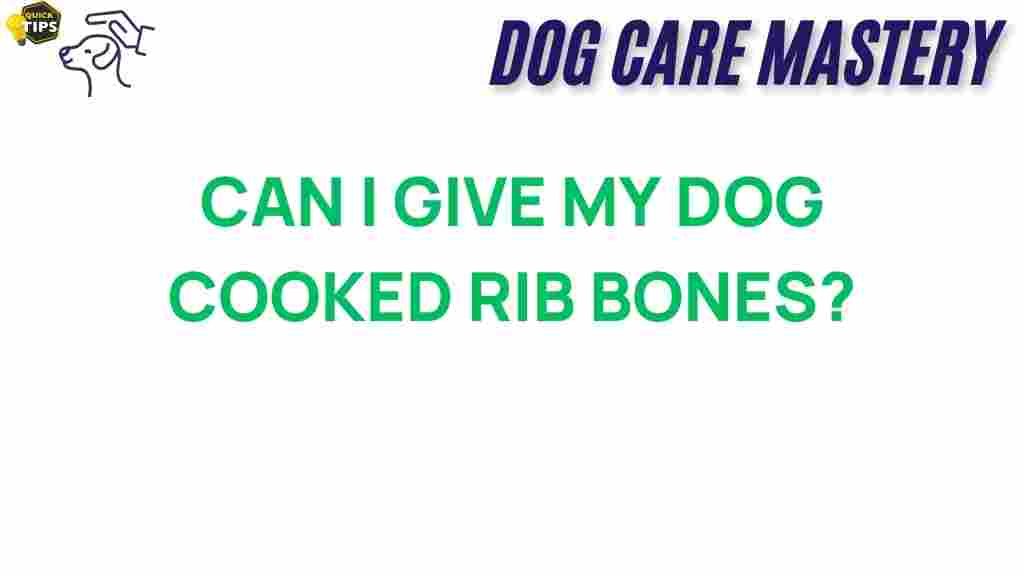The Truth About Cooked Rib Bones: Are They Safe for Your Dog?
As dog owners, we often want to share our meals with our furry companions, and one common question arises: are cooked rib bones safe for dogs? While it may seem like a treat, the reality is that cooked rib bones can pose serious health risks to your pet. In this article, we will delve into the potential dangers of cooked rib bones, what to do if your dog consumes one, and safer alternatives to consider.
Understanding Cooked Rib Bones
Cooked rib bones refer to the bones that remain after cooking meat ribs, such as pork or beef ribs. Many pet owners may be tempted to give these leftovers to their dogs, believing they are a natural and tasty treat. However, the truth about cooked rib bones is that they can cause more harm than good.
Why Cooked Rib Bones Are Dangerous
Cooked rib bones pose several risks to dogs, including:
- Splintering: When cooked, bones become brittle and can easily splinter. These sharp pieces can cause serious internal injuries, including:
- Punctured intestines
- Perforated stomach
- Choking hazards
- Obstruction: If a dog swallows a large piece of bone, it can become lodged in the throat or digestive tract, leading to blockages that may require surgical intervention.
- Dental Damage: Chewing on hard cooked bones can lead to broken teeth, which can be painful and may require veterinary care.
- Digestive Issues: Ingesting bone fragments can cause constipation or diarrhea, leading to further health complications.
Signs of Distress After Consuming Cooked Rib Bones
If your dog has consumed cooked rib bones, it’s crucial to monitor them for signs of distress. Look out for:
- Vomiting
- Excessive drooling
- Loss of appetite
- Abdominal pain or bloating
- Difficulty defecating
If you notice any of these symptoms, contact your veterinarian immediately for guidance.
What to Do If Your Dog Eats Cooked Rib Bones
If your dog has ingested cooked rib bones, follow these steps:
- Stay Calm: Panicking won’t help your dog. Try to assess the situation calmly.
- Check for Symptoms: Monitor your dog for any signs of distress as mentioned above.
- Do Not Induce Vomiting: Inducing vomiting at home can sometimes cause more harm than good. Only do so if instructed by a veterinarian.
- Visit Your Veterinarian: If your dog shows any signs of distress, schedule an appointment with your vet. They may perform X-rays to check for blockages or injuries.
Safer Alternatives to Cooked Rib Bones
Knowing the risks associated with cooked rib bones, consider these safer alternatives for your dog:
- Raw Bones: Raw bones are generally safer than cooked ones. They contain nutrients and are less likely to splinter. However, consult your veterinarian for recommendations on the best types of raw bones for your dog’s size and breed.
- Chew Toys: Durable chew toys designed for dogs can satisfy their chewing instincts without the risks associated with bones.
- Dental Treats: Many commercial dental treats can help maintain your dog’s dental health while providing a satisfying chew experience.
- Vegetable Chews: Some dogs enjoy chewing on carrots or sweet potatoes, which can be a healthy alternative that poses no risk of splintering.
Making the Right Choices for Your Dog
When it comes to your dog’s diet, it’s crucial to make informed decisions. Here are some tips to keep in mind:
- Consult Your Veterinarian: Always discuss your dog’s diet with your veterinarian. They can provide personalized recommendations based on your dog’s health needs.
- Read Labels Carefully: If you’re opting for commercial dog treats, ensure they are made from safe and healthy ingredients.
- Educate Yourself: Stay informed about pet nutrition and the potential dangers of certain foods.
Common Myths About Cooked Rib Bones
There are several misconceptions surrounding the safety of cooked rib bones for dogs. Let’s debunk some of the most common myths:
- Myth 1: Cooked bones are safe if they are large enough.
- Myth 2: Dogs can handle any type of cooked bone.
- Myth 3: It’s okay to give my dog rib bones occasionally.
In reality, the risks associated with cooked rib bones make them unsafe regardless of size or frequency. It’s best to avoid them altogether.
Conclusion
In conclusion, the truth about cooked rib bones is clear: they are not safe for your dog. The risks of splintering, obstruction, and potential digestive issues far outweigh any perceived benefits. Instead, consider safer alternatives that can provide your dog with enjoyment without compromising their health. Always consult your veterinarian for guidance on your dog’s diet and the best practices for keeping them safe.
For more information on dog nutrition and safety, check out this helpful resource. And don’t forget to keep your furry friend’s safety as a top priority!
This article is in the category Safety and created by dogcaremastery Team
